A hearing examiner decision issued last week could pave the way for the paving over of a row of trees on Wyatt Way.
Hearing Examiner Margaret Klockars rejected an appeal of a city-issued determination of non-significance for the planned Wyatt Place development.
The citizen group Save Bainbridge Trees had contested a portion of the developer’s plan, which calls for the removal of a Babylonia willow, Scouler’s willow and several locust trees to make space for a sidewalk and parallel parking. Winslow Holdings, the company developing the 1.4-acre property, plans to retain a maple on the corner of Wyatt Way and Madison Avenue, and would plant an additional 69 trees.
Ground won’t be broken on the project anytime soon, said Tad Fairbank of Fairbank Construction, one of the site’s developers. Fairbank said Wyatt Place is on hold as the group assesses the market for the development. Depending on economic conditions, construction could be delayed or the development could even be redesigned, which would open the possibility of the contested trees being retained, Fairbank said.
But Fairbank said the current plan was responsible and felt the appeal wasn’t well grounded.
“It’s personal opinions. I have my own personal opinions on the trees,” Fairbank said. “The reality is that Winslow was earmarked for much denser development.”
In a November hearing, Save Bainbridge Trees argued that clearing the trees would significantly impact aesthetic and historic aspects of the street.
In her findings, Klockars said she recognized the trees were of some aesthetic value.
“… the hearing examiner agrees that the exhibits show a spot of incredible beauty,” Klockars wrote, “and, for a city that takes pride in being a treed community, the loss of the trees would be felt.”
However, Klockars said the clearing would be somewhat mitigated by the retention of the maple tree and would fall within standards set by the city’s Community Forest Management Plan. Under city code the Wyatt Place developers are required to keep 15 percent of significant trees on the property, a quota met by the retention of the maple.
In the November hearing, a series of witnesses gave lengthy testimony to the historic value of the trees, which once marked the entrance of one of Bainbridge’s oldest homesteads. A historic home on the property has already been demolished and a water tower has been moved.
Klockars wrote that uncertainty about who had planted the trees, and the loss of surrounding historic structures diminished the trees’ cultural value.
“Though old, by themselves the trees provide no historical context,” Klockars wrote.
Plant pathologist and Save Bainbridge Trees member Olaf Ribeiro said he was disappointed in the decision.
“I was hoping they would look at it in the broader perspective of the trees’ value to the community,” Ribeiro said.
The group has 21 days following the decision to file an appeal.
Ribeiro said he would like to file an appeal of the decision in Kitsap County Superior Court, but will first consult with Save Bainbridge Trees attorney Ryan Vancil. Ribeiro has said he would consider a tree sitting protest if the clearing was allowed to proceed.



